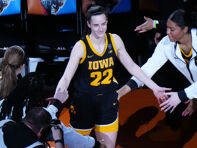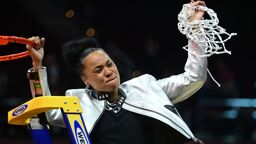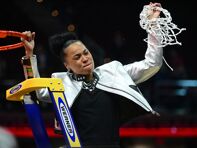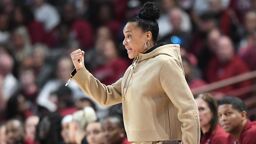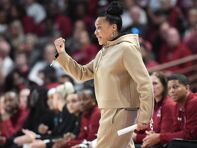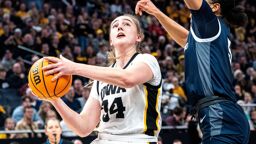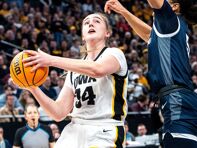One of the roads to the NCAA Men’s Basketball Final Four in Indianapolis in 2021 goes through Boise, Idaho. But now a number of voices across sports and LGBTQ rights advocacy have called for a detour on that road.
A group of 60 civil rights organizations, student-athletes, and elite athletes drafted a letter Wednesday, lobbying the NCAA to pull the scheduled first and second round NCAA men’s basketball tournament games out of Boise. Those games are scheduled for March 18 and 20, 2021.

A who’s who of LGBTQ athletes as well as allies from professional pro sports, Olympics, and Paralympics signed on to the letter. Among the signatories are tennis legend and Women’s Sports Foundation founder Billie Jean King; U.S. Women’s Soccer star Megan Rapinoe; her girlfriend 3-time WNBA Champion Sue Bird; the sports world’s only out gender non-conforming athlete, Layshia Clarendon of the N.Y. Liberty; New York Knicks guard/forward Reggie Bullock; and the NBA’s first openly gay athlete Jason Collins. They demand the NCAA pull out of Idaho, noting that the enactment of the law that was known as House Bill 500, set to go into effect July 1, is a direct contradiction of the inclusive policies of the NCAA.
“Failure to move championship events out of Idaho would contradict the NCAA’s core values and would be an implicit endorsement of Idaho’s discriminatory law,” the letter states. “Since the beginning of competitive sport, we have become a better and stronger global athletic community by expanding access, not by withholding it. With this letter, we ask the NCAA to stand with their commitment to inclusivity, and move all events out of Idaho.”
There is precedent for the NCAA to make such a decision. In 2016, when North Carolina enacted the anti-transgender law known as “the bathroom bill,” HB2, the NCAA joined the organizers of other sports and entertainment events by moving 2017 men’s college basketball tournament games scheduled to be played in Greensboro, N.C. to Greenville, S.C. That decision may have led to an early tourney exit for one of North Carolina’s most fabled programs. Duke, which would have played the first and second round games of the draw at home before a supportive crowd in Greensboro had it not been for the law and the NCAA move, were instead upset by South Carolina before a lustily-cheering Gamecocks crowd.

House Bill 500, dubbed “The Fairness in Women’s Sports Act” by its authors and supporters, is the first statewide ban on transgender girls and women from athletic competition at all levels in the U.S. This includes Idaho’s public colleges and universities, despite NCAA policies which have allowed transgender student-athletes to compete since 2011.
In an official statement, the NCAA stood up in opposition to the law. “HB500 is harmful to transgender student-athletes and conflicts with the NCAA’s core value of fair treatment of all individuals,” the organization said in its statement. “The membership believes that transgender student-athletes should have nondiscriminatory and respectful participation opportunities on college sports teams, and we are working to understand how this law will impact college athletes in Idaho. It is our hope that all individuals will be treated with fairness and respect in athletics.”
Idaho Governor Brad Little signed HB500 into law on March 30, and now the fight has moved from the statehouse to the courthouse. Boise State freshman Lindsey Hecox, who hopes to join BSU’s cross country team next season, is suing Little with help from the American Civil Liberties Union, to stop the law from going into effect. In response, two cisgender women on the Idaho State University track and field team, represented by a former Idaho Republican lawmaker, entered the fray on May 28. Madison Kenyon, 19, of Johnston, Colo., and 20-year-old Mary Marshall of Twin Falls, Idaho filed paperwork to join in the lawsuit in defense of the new law.
In addition to the professional athletes, the letter to pressure the NCAA was also signed by over 400 NCAA student-athletes and coaches. Among those who signed were Boise State assistant tennis coach Maria Lopez, and BSU junior cross country athlete Malia Pevic, who would be a teammate of Hecox next season if the law is stopped from going into effect.








